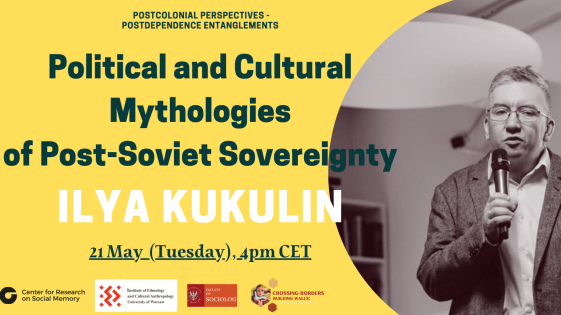Political and Cultural Mythologies of Post-Soviet Sovereignty
Join us for open seminar of the POSTCOLONIAL PERSPECTIVES - POSTDEPENDENCE ENTANGLEMENTS series!

To this day, the following explanatory scheme has become widespread in public discussions of the collapse of the Soviet Union: the dissolution of the USSR in 1991 was the disintegration of an empire, but Russia remained an empire in many ways and therefore retained its aggressive essence. This scheme seems to me too reductionist. It is based on a simplistically conceptualized postcolonial theory, which assumes that the collapse of a colonial empire occurs because of an enslaved nation's struggle for freedom. The collapse of the Soviet Union was not like this. The new states on the ruins of the USSR emerged not as a result of the struggle of enslaved peoples, but as a result of the crisis of central power. We could now discuss in what ways the new political elites of the former “union republics” -- and especially Russia -- reproduced the Soviet notion of sovereignty, and what new elements were included in this notion. In my paper, I hope to discuss the cultural and political mythologies of sovereignty that have proliferated in the public rhetoric and Russian language literature of the “perestroika” period and in Russia in the 1990s.
Ilya Kukulin is a literary critic, cultural historian, and cultural sociologist. Currently, he is a research fellow at the Amherst Center for Russian Culture. He authored a book Machines of the Noisy Time: How the Soviet Montage Became an Aesthetic Method of the Unofficial Culture (Moscow, 2015) and co-authored a monograph A Guerilla Logos: The Project of Dmitry Aleksandrovich Prigov (Moscow, 2022, with Mark Lipovetsky); in 2019, he also published a volume of selected articles and essays The Breakthrough to an Impossible Connection.
Series „Postcolonial perspectives–postdependance entanglements” is organized inframes of two researchprojects sponsored by the National Science Centre, Poland no. 2020/39/B/HS6/02809 and no. 2021/41/B/HS3/00852.


